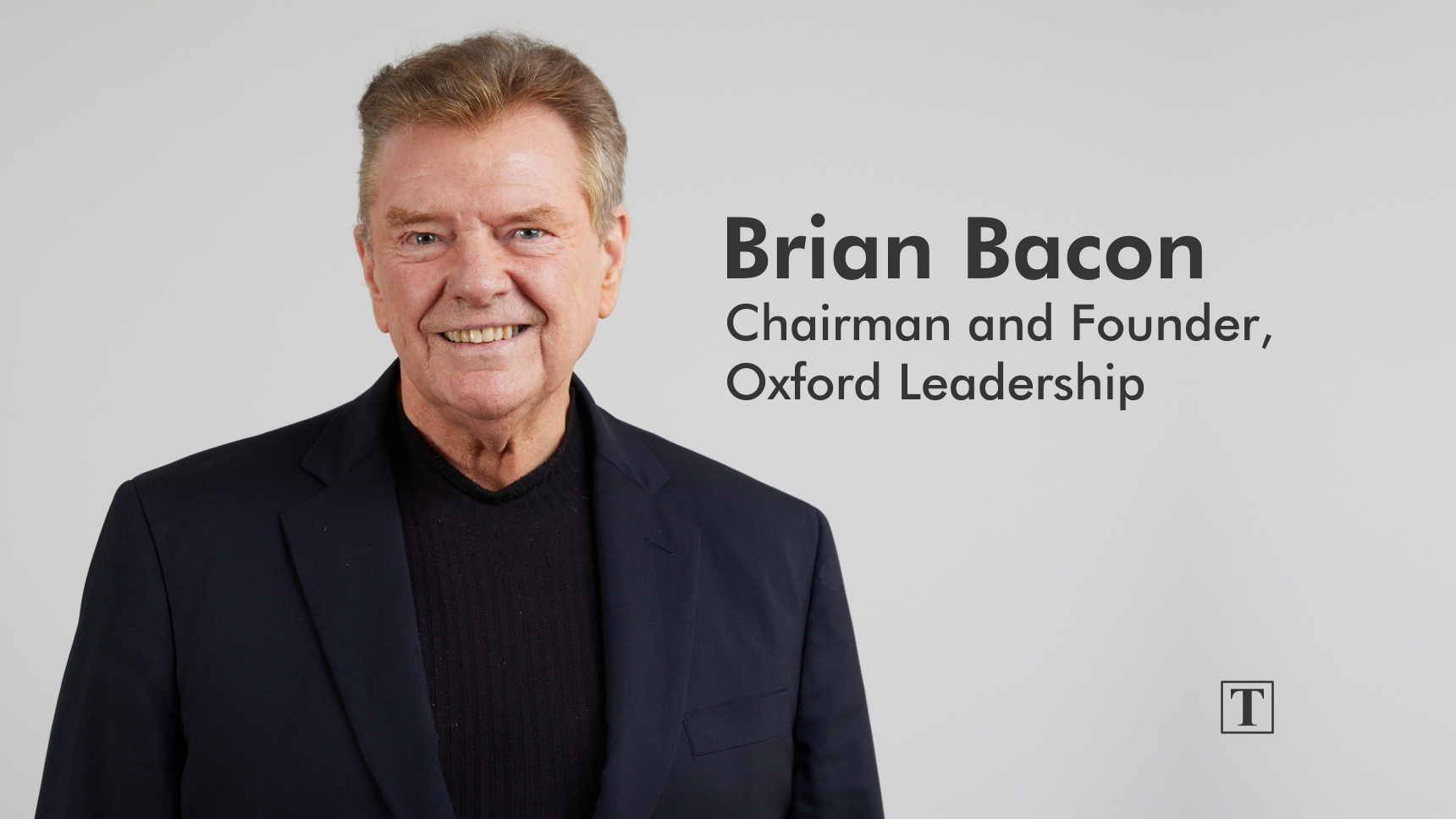The demand for business coaches is expected to rise as more businesses look to boost performance and productivity. As such, they will seek guidance regarding organizational development, leadership training, and other types of coaching services. This is where Brian Bacon (Chairman and Founder of Oxford Leadership) comes into the picture. Based on his experience in over 30 global business turnarounds, he has been a leading consultant to the Boards and C-Suite of numerous multinational corporations.
The Entrepreneurial Journey
At the beginning of his career, Brian worked as a strategy guy in the advertising business and specialized in strategy execution. This was because he had been schooled at the University of Chicago Business School on strategy and how it’s executed. And at the time, he was particularly interested in how strategies were carried out in international markets. His first job was with Foote, Cone & Belding (FCB), and from there, he was hired by McCann-Erickson, the Coke agency.
The professional business coach recalls, “At that time, it was a period which we’d look back on now and say, Well, this was the early stages of globalization. It wasn’t dubbed internationalization of that, and, our task was to create a central marketing strategy for a brand when deployed that was similar campaigns with minimal variance in global markets.” So it was an eventful period. In addition, Brian developed a strong opinion on the value and role of business as a social good agent. He firmly believed that businesses should act morally and ethically. However, his professional work at McCann-Erickson on Coke and then at a business named Dordain Burnback was focused on how to execute strategy.
“This became really major work, and my specialization was on strategy execution. And what led me to realize is that there are two things which, of course, you’ve got to be successful in mastering not only in business and strategy execution but in life, and that is context and choices,” says Brian. He further adds, “The choices that you make are highly dependent upon context upon the situation. And what I realized is that those parts of the world, those markets are those countries or those regions, which were successful at executing strategy relative to those that were less successful, had much more to do with the leadership than anything else. It was the leaders that made a difference.”

The ability of the leader to comprehend what was really happening in this market with these customers, how to make the necessary small-step improvements to the strategy to make it succeed, and going beyond that was crucial. It also occurred to Brian very clearly that what it was about those leaders that made them stand out from many of the others was their ability to be able to create an environment where local people, the local management, were able to really get involved, and they created an environment in a context for change to happen, or a strategy execution to happen. So he developed a point of view about leadership, about culture, and about how organizational culture actually becomes an enabler of strategy execution. This idea that strategy execution is mainly tied to the competencies of the leadership became a point of view for him.
“So very, very early, my core expertise has been strategy execution. How do you get plans executed? And what’s the role of the leaders in that? And so that became a strong point of view. For the group I was running by this stage, I was at Doyle Dane burnback. I started the strategy group known as Needham consulting. And our area of expertise very, very particularly was this it was around strategy execution for big global brands. And in that time, and around that work, I started to evolve the languaging and the point of view about the need to be purpose-driven because what was clear to me that the companies that were really successful in being able to execute their strategy on a global landscape, were able to do three things. Very well,” states Brian.
He further explains, “They’re able to get an alignment of the senior people of the organization with the strategy. So alignment with the strategy, they all understood what it was, they were all aligned with it, and all had clear buy-in. Hence, number one was alignment. Number two was engagement. And I found that the leaders did, in being able to secure not just alignment so people would understand the strategy, but they’d get really engaged with it. And this was the second factor of engagement, the ability that the leaders had to be able to get fierce resolve amongst their people really engagement with the strategy and its execution. So they did not just have their heads; they knew what the strategy but they had their hearts as well. This was something really worth doing. And then the third element that I found that leaders did was they’re able to still instill in their teams in their people in their direct reports. A fierce accountability. People wouldn’t be held accountable that hold themselves accountable.”
As a result, these three lessons helped Brian create a formula for his strategy execution which involves Alignment, Engagement, and Accountability. What is now referred to euphemistically as purpose-driven leadership played a significant role in bringing them together in this context and surrounding it. It was a purpose beyond products, beyond profits, and beyond self-aggrandisement. And when the professional business coach looked at the best leaders that were most effective at executing strategy, this is what he saw, and this became part of the formula he used around purpose-driven leadership.
At that time, Brian and his team evolved and created what is now known as a strategic compass, which encouraged people to consider the connections between their own purpose, the purpose of the product, the purpose of the business, and the purpose of society as a whole. And this develops into a purpose-driven company as well as a brand. And that was a critical piece.
“So my journey from there those were those early days where I evolved those concepts, certainly from a social impact point of view, but largely because I saw the efficacy of this the effectiveness, that when you lead with a sense of purpose, and you create a context for things to happen, people would respond to it, then the execution of your strategy was much more profound. So my journey is very, very quick. The Needham Consulting Group was hugely successful,” shares Brian.
Brian created this company in the early 1980s with his research partner, Oxford Research, Dr. Kim Mala, from Copenhagen. They jointly bought the company to form Oxford IPC. And Oxford research was originally an outreach of Oxford University, Oxford Analytica. And then, the Trustees of the University basically decided to withdraw from public-private sector partnerships. And they took on the role that Oxford University was playing. So that explains Oxford in the name of Oxford leadership.
In the following years, the Oxford Leadership Academy evolved into a stand-alone company that focuses on creating leaders who can implement strategy at a global level with high effectiveness and high efficiency.
The Rise Of Oxford Leadership
Oxford Leadership emerged in 2003 and found its feet through 2003 and 2005 in the form of a specialist leadership consultancy around purpose-driven leadership. Its mission statement or purpose statement was transforming business for good, and that’s exactly what Brian and his team stood for. They broadened that largely to transforming leaders for good because they didn’t want to exclude organizations in the public sector and, indeed, also in the third sector.
“But to give you a sense of what ox leadership is, so we’re a specialist leadership consultancy, sitting in between the big management consultancies and the big University Executive Education operations where practitioners we work for the top of the house, the senior leaders, the CEO in the C suite, and then you know, the top 100 leaders in organizations that’s where we primarily exist,” explains Brian.
Oxford Leadership was called in on the leadership and culture side usually, along with the big management consultancies that had executive plans. They had strategic plans but needed help to put them into action. So Oxford leadership has always been a business about strategy execution. And its methodology, which is IP-based, works around this meet and asks for a formula: leading the team, leading your organization, and becoming a leader in society.
“That’s basically the thematic and process and procedural methodology of our formula that we’ve applied in some of the biggest companies in the world. We have been behind the turnarounds of companies like Volvo Ericsson, McDonald’s, Levi’s, Unilever, L’Oreal, the Virgin Group, HSBC, and some of the world’s biggest well-known corporations. Over the last 20 years, we’ve worked the top of the house with these companies, and many continue to be clients,” says Brian.
The professional business coach and his team have developed, trained, and certified over 400 consultants and coaches to deliver their work worldwide in the United Kingdom, Europe, the United States, North America, Canada, Mexico, Asia, Latin America, and the Middle East. Therefore, they can support the worldwide execution of strategy practically everywhere. More than a million people make up their alumni base. They have participated in more than 300 business turnarounds, and more than 400 consultants and coaches have been trained in their IP globally. The next phase of their evolution is to expand this even further. So, they have teamed up with some incredible digital businesses.
Vital Attributes Of Leaders
According to Brian, the two things that every leader and entrepreneur must finally master are context and choices. Ultimately, everything will depend on their decisions, especially the major strategic decisions like what markets to enter and which items to promote. “Which industries do I serve? How can I establish context for who belongs on the team and who shouldn’t? You know, great strategic resources, heavy capital-intensive choices, and decisions will make you or break you; that goes without saying, but at a leadership level, it is also the small, almost imperceptible choices you make every day about your own behaviour,” explains Brian.
He further adds, “The ability to zoom out and then zoom in any situation is what I refer to as context. Context drives good choices. But what’s in between the two of these is, is clarity, clarity of purpose, clarity of intent.” Along with this, what Brian found consistently is that there are six factors in leadership that show up most consistently, and it was Leading With Meaning, Adaptability, Creating Psychological Safety, Building Trust, Empathy, and Results.
Five Attributes Of A Coach
“Sometimes I find myself coaching, sometimes I find myself mentoring, and you know, the support for clients is a combination of both. It’s not unusual that you will be coaching, and I’ll be coaching the CEO or one or more members of the C suite but also coaching them as a team,” says Brian.
A good coach will focus on clearly defined goals, all of which are aimed at helping the coachee achieve their full potential. For him, what great coaches do is get very, very clear. He talks about freedom within a framework, and there should always be a basic framework of what it is that Brian and his team are going to do. “Understanding where we’ve come from, looking at patterns, defining strengths that you can build on, as well as your work on the point of view that I have about great coaches,” says Brian.
So what a great coach does or a great mentor is really drilled down on what are the strengths that this person has that can define operational excellence that can really define their success and lift them to the next level. At the same time, leaders need to be able to be straight up to identify the things that they need to work on. And for that, one of the attributes of the coach, which Brian thinks is particularly important, that he would certainly look for in adding new coaches and new mentors to their lineup. And what is referred to as a locus as an internal locus of control. And locus of control is a well-known psychological term that basically means that your sense of well-being your sense of fulfillment, and confidence come from the inside and are not reliant upon external conditions.
“Have a great mentor; you really have to care. You’ve got to lead with love. You’ve got to be there with a spirit of service of genuinely wanting this person to get better, a little bit like a mother and a child. And I don’t say, you know, the practice of tough love is everything, and in fact, I mean, tough love. I would reverse the words. I would say love tough lead with love lead with care lead with concern, but at the same time, really hold people to account. These are some attributes that I think are important in a good coach,” explains Brian.




